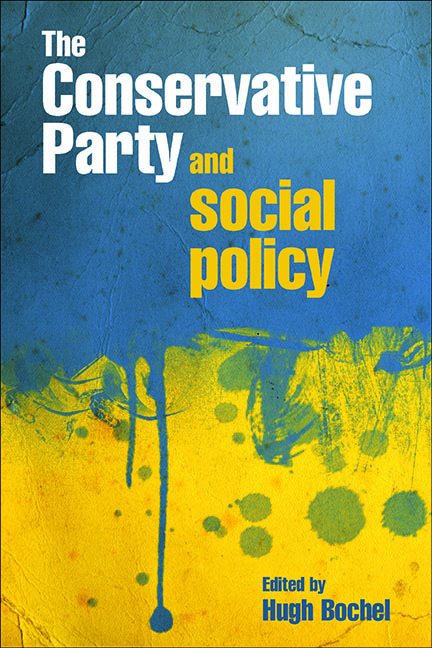Book contents
- Frontmatter
- Contents
- Notes on contributors
- one Conservative approaches to social policy since 1997
- two The Conservative Party and the welfare state since 1945
- three The Conservative Party and public expenditure
- four The Conservatives, social policy and public opinion
- five Conservative health policy: change, continuity and policy influence
- six Something old, something new: understanding Conservative education policy
- seven Conservative housing policy
- eight Social security and welfare reform
- nine A new welfare settlement? The Coalition government and welfare-to-work
- ten The Conservative Party and community care
- eleven Conservative policy and the family
- twelve Crime and criminal justice
- thirteen The Conservatives and social policy in the devolved administrations
- fourteen The Conservatives and the governance of social policy
- fifteen The Conservatives, Coalition and social policy
- References
twelve - Crime and criminal justice
Published online by Cambridge University Press: 01 September 2022
- Frontmatter
- Contents
- Notes on contributors
- one Conservative approaches to social policy since 1997
- two The Conservative Party and the welfare state since 1945
- three The Conservative Party and public expenditure
- four The Conservatives, social policy and public opinion
- five Conservative health policy: change, continuity and policy influence
- six Something old, something new: understanding Conservative education policy
- seven Conservative housing policy
- eight Social security and welfare reform
- nine A new welfare settlement? The Coalition government and welfare-to-work
- ten The Conservative Party and community care
- eleven Conservative policy and the family
- twelve Crime and criminal justice
- thirteen The Conservatives and social policy in the devolved administrations
- fourteen The Conservatives and the governance of social policy
- fifteen The Conservatives, Coalition and social policy
- References
Summary
It would normally be quite straightforward to summarise and appraise the law-and-order policies of an incoming administration six months into its term of office. As others in this volume have also pointed out, times are far from normal, for two reasons. We have a Coalition government for the first time since 1945 (discounting the less formal Lib–Lab pact of 1977/78) and we are entering a period of unparalleled cuts in public-sector expenditure. These factors substantially curtail each of the Coalition parties’ freedom of manoeuvre to implement the criminal justice policies that appeared in their manifestos – which only months after the election already had a somewhat historic feel to them.
At the time of writing it had been announced in the new government's spending review that criminal justice agencies, like the majority of the public sector, would receive cuts of around 25% over a four-year period. Clearly, given such pressures, there are unlikely to be any new initiatives that carry a significant price tag, or even ones that have significant set-up costs. Offering a commentary on the criminal justice policies that we can expect to see over the lifetime of this administration is therefore more a question of divination than of manifesto content analysis. The approach that is taken here is, first, to summarise the key thrust of criminal justice policy over the last 30 years; and then to ‘read the runes’ to see what sorts of continuity or discontinuity we can expect.
The context: criminal justice policy since 1979
This summary of criminal justice policy over the last 30 years is impressionistic. It makes no claims to be definitive, but it should provide an adequate benchmark against which to examine emerging Coalition policies. In some policy areas readers might reasonably expect an analysis broken down by different political parties. In criminal justice policy, however, one can differentiate clearly between the period from 1979 to 1992, when the Conservatives pursued a surprisingly liberal set of policies, and the period from 1993 to 2010, when the main parties seemed consistently locked in a competition to ‘out-tough’ each other on law and order. The differences between the two periods are greater than the differences between the two main parties.
- Type
- Chapter
- Information
- The Conservative Party and Social Policy , pp. 215 - 228Publisher: Bristol University PressPrint publication year: 2011



